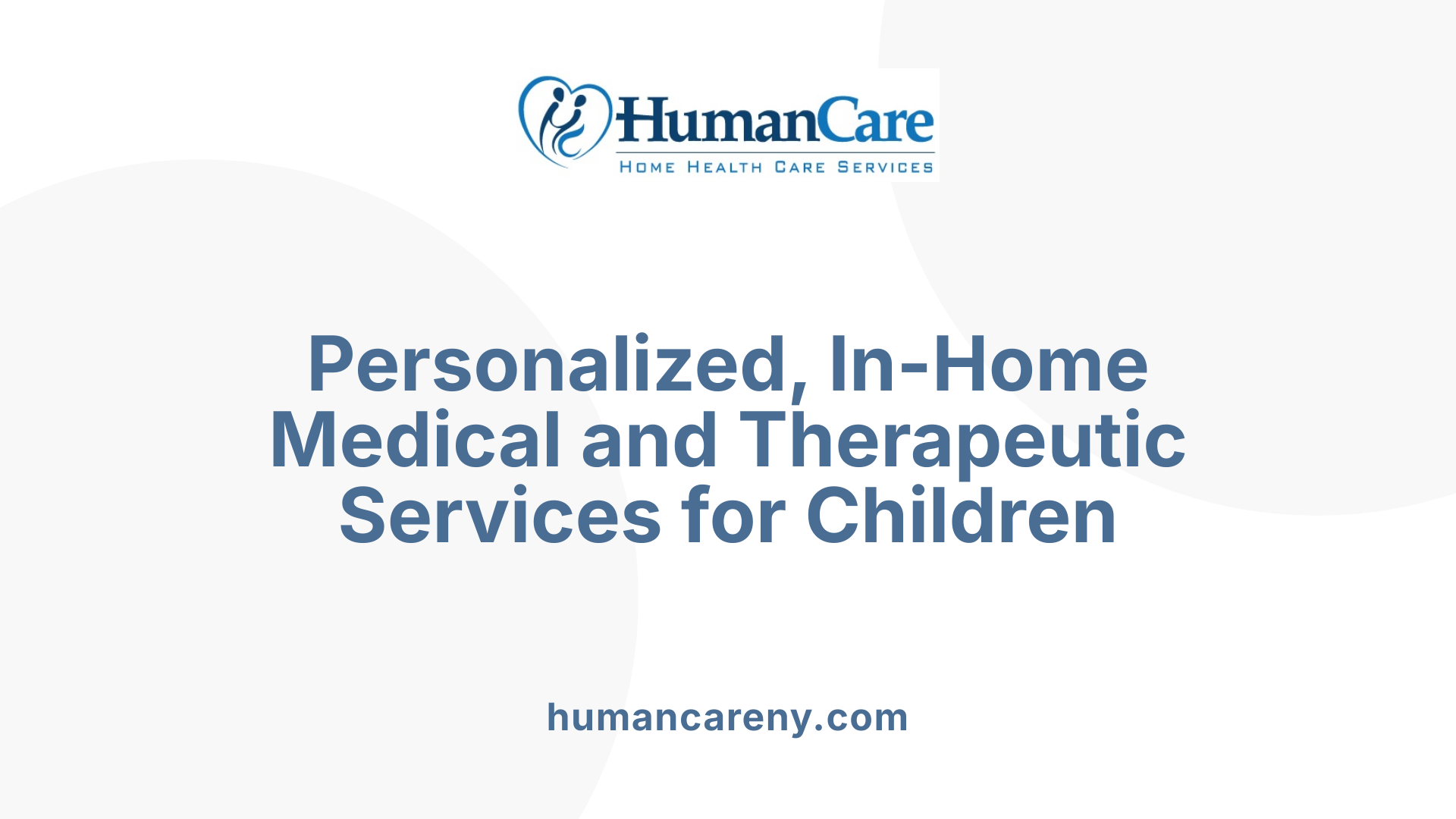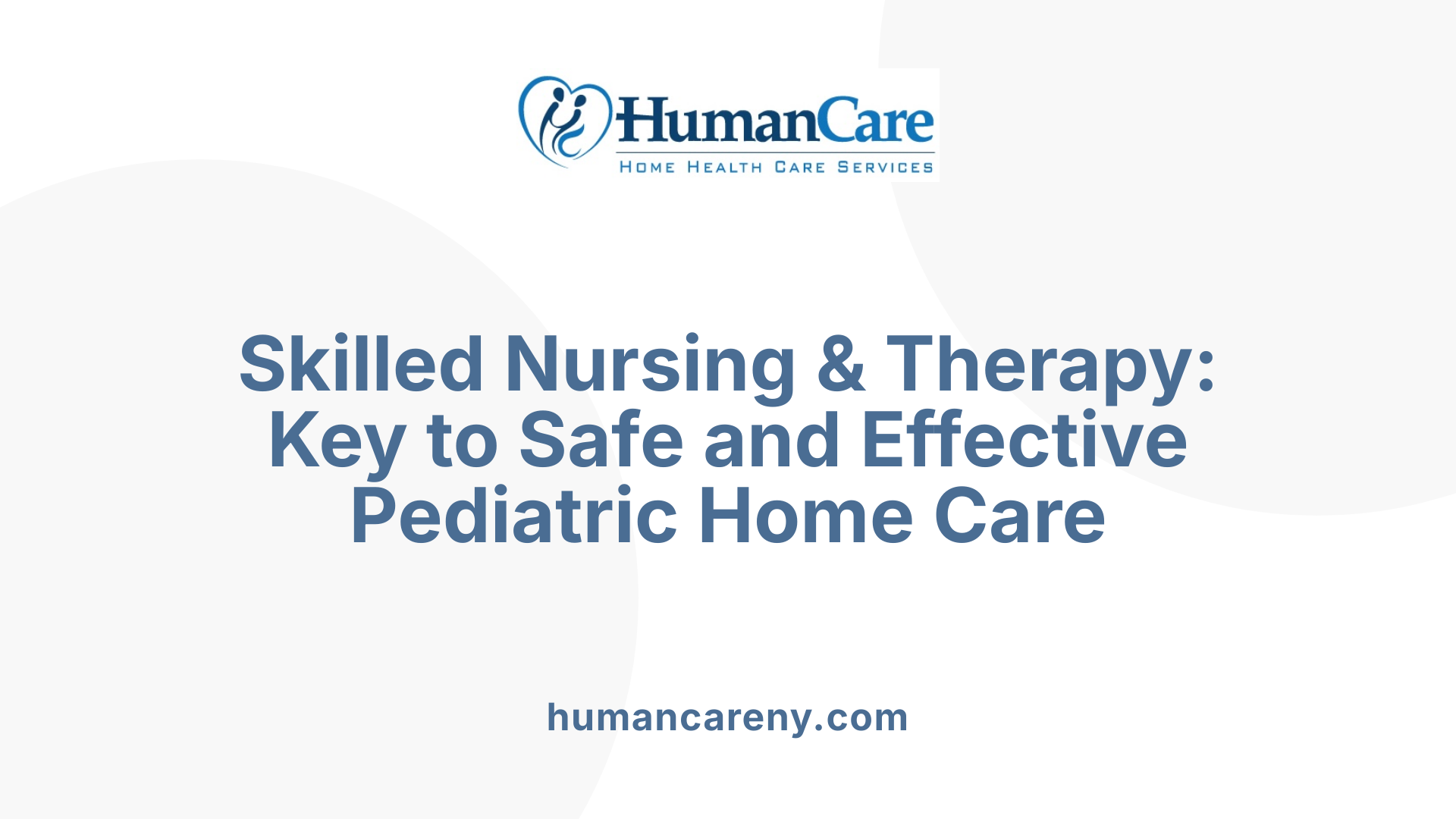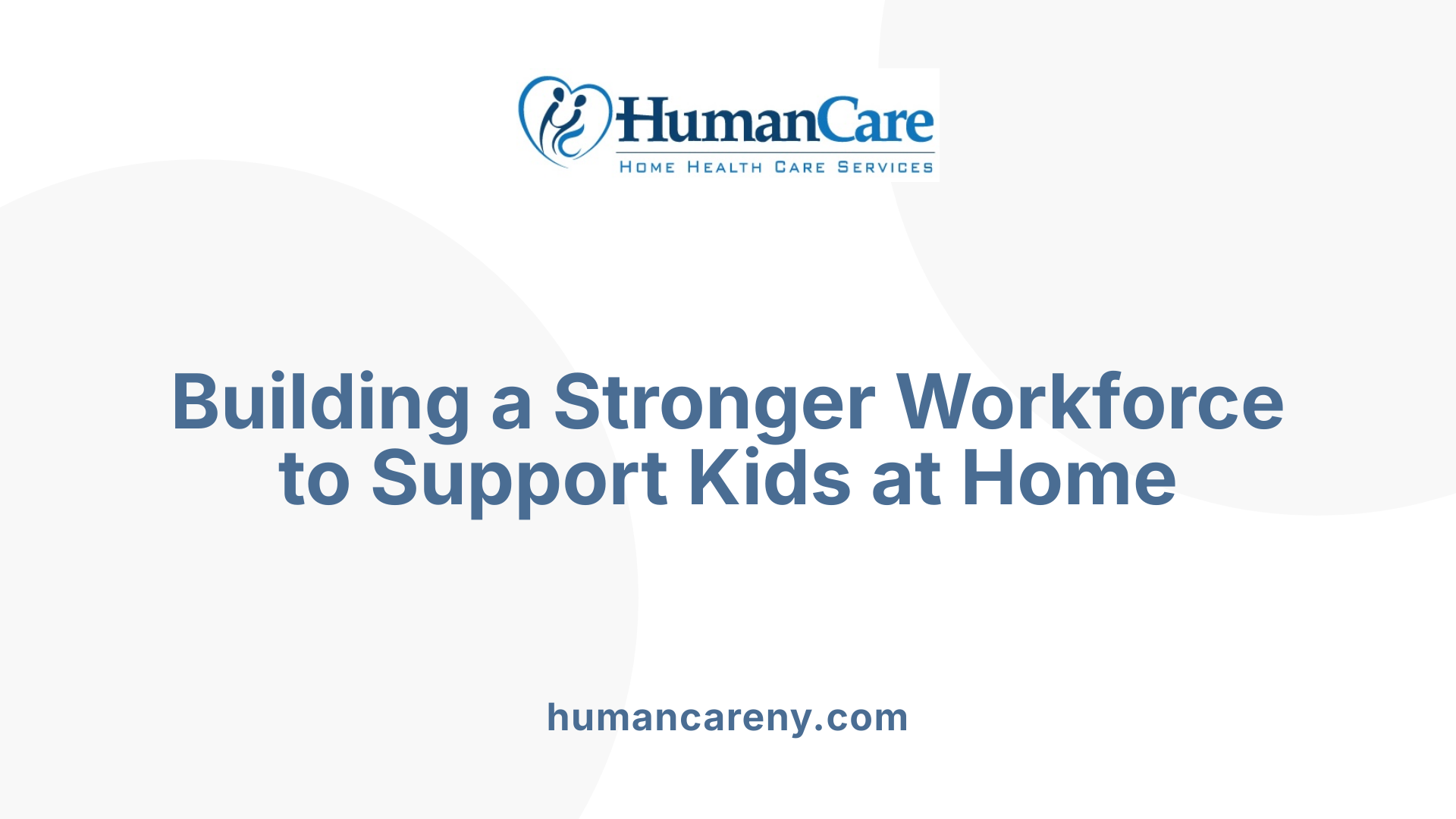Bringing Hospital-Level Care Home
Pediatric home care is increasingly essential for children with complex medical needs who rely on technological support to sustain their health. By delivering specialized treatments in the familiar comfort of home, this care model reduces hospital stays and empowers families to manage their children's conditions effectively. This article explores how pediatric home care supports medically complex children, the challenges families face, and the broader implications for care delivery.
Understanding Pediatric Home Care and Its Scope

What is Pediatric Home Health Care?
Pediatric home health care delivers medical treatments and therapies directly in a child's home. This approach supports children recovering from hospital treatments or managing chronic conditions, reducing prolonged hospital stays and helping maintain family routines.
Which Medical Conditions Are Commonly Treated?
Pediatric home health care addresses a broad spectrum of conditions, including:
- Prematurity complications
- Cardiac and respiratory diseases
- Neurodegenerative and genetic disorders
- Developmental delays
- Recovery from injuries
- Childhood cancers
- Nutritional deficiencies
Children with complex medical needs, often dependent on life-sustaining technologies, benefit significantly from these services.
What Services Does Pediatric Home Care Provide?
Services offered cover a wide range of therapeutic and medical needs, including:
- Nursing evaluations and medication administration
- Physical, occupational, and speech therapy
- Oncology treatments like chemotherapy
- Palliative and hospice care
- Infusion therapies
- Neonatal care for premature infants
- Skilled nursing tasks like wound management, IV therapy, and respiratory support
How is Preparation and Coordination Managed?
Starting pediatric home care involves a medical referral followed by an assessment to determine equipment needs. Coordination with the child’s pediatrician ensures that care plans are tailored to specific medical orders, guaranteeing personalized and comprehensive treatment.
Together, these carefully coordinated services and preparations create an environment where children receive one-on-one, individualized care in the comfort and familiarity of their own home.
The Benefits of Pediatric Home Care for Technology-Dependent Children

Improved Comfort and Faster Healing
Pediatric home health care allows children, especially those dependent on medical technology, to receive treatment in a familiar, comforting environment. This personal setting enhances their emotional well-being and can lead to faster recovery by reducing the stress and disruptions often associated with hospital stays.
Reduction in Hospital Visits and Readmissions
One-on-one, personalized attention tailored to the child's medical orders reduces the need for frequent hospital visits and readmissions. Skilled nursing care and therapy services delivered at home ensure continuous monitoring and timely interventions, helping to prevent complications.
Tailored Treatment Plans Aligned with Home Environment
Care providers perform thorough assessments to customize treatment plans based on the home environment and the child’s specific needs. This alignment ensures that equipment like ventilators, feeding pumps, or respiratory support devices function properly and safely within the family's routine.
Convenience and Maintenance of Family Routines and Schooling
Receiving care at home allows children to maintain their usual schooling and family routines, minimizing disruptions in their social and educational development. It also offers families increased convenience, as parents can coordinate care alongside daily household responsibilities.
Emotional Well-Being from Care in Familiar Surroundings
Home-based care promotes emotional stability for children with complex conditions by surrounding them with loved ones and familiar settings. This emotional support is crucial for long-term health and supports families by providing training and confidence to manage emergencies and daily care tasks effectively.
Critical Role of Skilled Nursing and Therapy Services at Home

Skilled Nursing Care Including Wound and Tracheostomy Management
Pediatric home health care provides specialized skilled nursing services essential for children with complex medical needs. Nurses deliver wound care, managing infections and promoting healing, and perform tracheostomy care, ensuring airway patency and preventing complications. They also administer intravenous (IV) therapies and manage respiratory support devices, contributing to comprehensive medical management within the child's home.
Respiratory Support Such as Ventilator Management and Oxygen Therapy
Children dependent on respiratory assistance receive expert care through oxygen therapy, ventilator management, and suctioning services provided by qualified home care professionals. This support is critical for maintaining adequate breathing and preventing respiratory distress, significantly reducing hospital visits and enabling children to remain in a comfortable, familiar environment.
In-Home Therapies: Physical, Occupational, and Speech Therapy
Therapeutic services are integral to pediatric home care, focusing on developmental and functional improvement. Physical therapy enhances motor skills and mobility, occupational therapy targets developmental milestones and daily living skills, and speech therapy improves communication abilities. These tailored therapies help children gain independence and improve quality of life while recovering or managing chronic conditions.
Infusion Therapy and Oncology Treatments
Home health care extends to delivering infusion therapies, including chemotherapy for pediatric cancer patients. Nursing staff monitor treatment progress and side effects closely, ensuring safe administration and supporting family comfort during this challenging time.
Caregiver Training and Emergency Preparedness
In addition to direct care, home health professionals equip parents and guardians with training to manage daily medical tasks and emergencies confidently. This preparation empowers families, fostering resilience and reducing anxiety by teaching them to handle medical equipment, recognize emergency signs, and execute care plans effectively.
These skilled nursing and therapy services constitute the backbone of effective pediatric home health care, promoting healing, development, and safety for children while supporting families through education and personalized care.
Challenges Families Face Managing Children With Medical Technology at Home

Medical supplies and equipment barriers
Families caring for children who rely on medical technology often confront significant obstacles related to supplies and device management. Heavy, bulky equipment can be difficult to transport outside the home, limiting outings or emergencies. Furthermore, safety issues such as tubing becoming dislodged or tangled pose constant risks that require vigilant monitoring. Equipment malfunctions add stress and complexity to daily care routines.
Disruption of family life and routines
The integration of intensive medical care at home frequently disrupts normal family life. Over a quarter of families report significant interruptions to their daily routines due to caregiving demands. Balancing medical appointments, therapy sessions, and school remains a challenging juggling act. Nearly 35% of families experience difficulties managing personal and family life alongside caregiving responsibilities.
Safety concerns and healthcare financing issues
Safety remains a paramount concern, affecting nearly 14% of these households. Families must be prepared for emergencies and complex care scenarios, which can be overwhelming without adequate support. Additionally, healthcare financing presents challenges for nearly 9% of families, encompassing coverage limitations and out-of-pocket costs that add financial strain.
Complex daily management tasks and emotional impact
Providing care for medically complex children requires rigorous organization, planning, and problem-solving skills. Parents often innovate creative solutions and advocate persistently with schools and insurers to meet their child’s needs. Emotional resilience is essential as families navigate the stresses of equipment management, therapy, emergencies, and the constant vigilance these conditions demand. Support from social networks and healthcare providers helps families manage these multidimensional challenges effectively.
Strategies and Supports That Help Families Cope
How Do Families Adapt Their Routines and Care Plans?
Families caring for children with complex medical needs often practice flexibility by adjusting daily schedules, routines, and medical care to meet their child's health requirements while maintaining family life. This adaptable approach helps balance caregiving demands with personal and family time.
What Role Does Social and Healthcare Provider Support Play?
Support from family members, friends, community resources, and healthcare providers is essential. Emotional encouragement and practical assistance contribute significantly to caregivers’ well-being and their ability to manage daily challenges effectively.
How Do Organizational Skills and Creativity Aid Families?
Proactive organization and advanced planning for daily routines and emergencies allow families to handle caregiving complexities confidently. Creative problem-solving, such as improvising devices or adapting schedules, helps overcome obstacles like equipment malfunctions and unpredictable situations.
Why Is Advocacy Important for These Families?
Parents often become advocates for their children by liaising with schools, insurance companies, and healthcare providers to secure necessary resources and accommodations. This advocacy ensures the child’s medical, educational, and financial needs are met.
How Do Parents Demonstrate Resilience and Adaptation?
Through innovation, flexibility, and determination, parents develop resilience, successfully managing the demanding caregiving tasks. Their ability to adapt day-to-day enables them to provide continuous high-quality care despite challenges.
Addressing Workforce Shortages to Improve Pediatric Home Care Outcomes

What is the current shortage of qualified pediatric home health nurses?
The pediatric home health sector faces a critical shortage of qualified nurses, including Registered Nurses (RNs) and Licensed Practical Nurses (LPNs). This shortage constricts the ability to deliver comprehensive care to children with complex medical needs in their homes.
How does this shortage impact hospital stays and family caregiving burdens?
Due to insufficient nursing staff, many children with medical complexity experience longer hospital stays than necessary, delaying their transition to home care. At home, families often fill caregiving gaps themselves, adding emotional and physical strain.
What barriers contribute to workforce shortages?
Several factors contribute to the shortage: low wages and inadequate benefits reduce nursing job appeal; many nursing programs offer limited exposure to home healthcare settings, resulting in fewer graduates interested in this field; and the demanding nature of providing specialized care in family homes can lead to high burnout rates.
What solutions are being proposed to address these issues?
- Nursing Student Exposure: Increasing clinical rotations in home healthcare to familiarize future nurses with this setting.
- Training for Non-Nursing Staff: Credentialing and educating Certified Nursing Assistants (CNAs) and personal aides to support nursing roles.
- Parent Education: Empowering parents with training to manage complex care tasks safely at home.
Why are workforce improvements significant for sustainable pediatric home care?
By tackling staffing shortages and improving care team capacity, pediatric home health care becomes more reliable and reduces unnecessary hospitalizations. Enhanced workforce support ensures children with medical complexity receive personalized, high-quality care in the comfort of their homes while alleviating family caregiving pressures.
A Path Forward for Supporting Technology-Dependent Children at Home
Pediatric home care provides indispensable support for children reliant on medical technology, combining clinical expertise with compassionate family-centered approaches. While benefits in comfort, continuity, and individualized care are clear, families face significant challenges in managing complex technologies and routines without adequate professional support. Addressing the critical shortage of qualified home health nurses and enhancing training for caregivers will be vital to enhancing care quality and outcomes. Continued innovation, advocacy, and resource investment in pediatric home care represent the best path to ensuring these vulnerable children thrive in the environments they call home.



